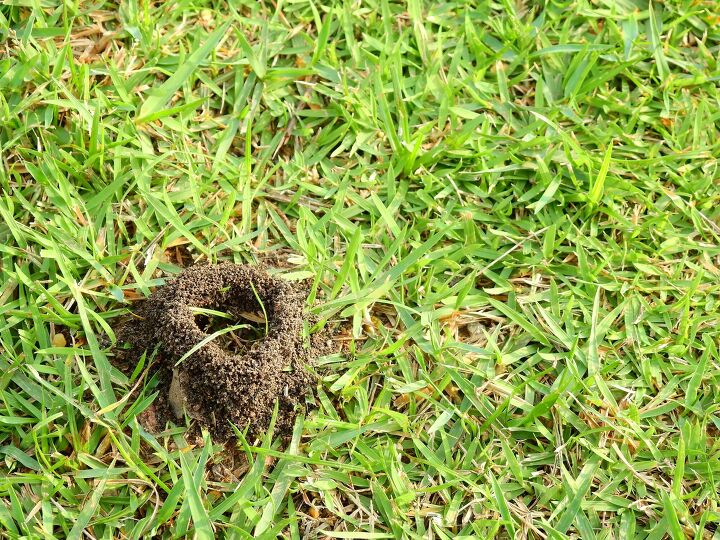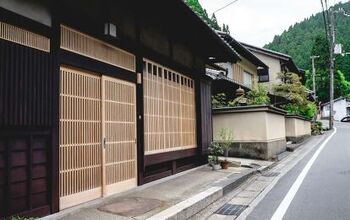Why Are There So Many Ant Hills In My Yard?

The sight of ants in your yard or home can understandably be discomforting. Not only are ant hills ugly, but they can indicate that you have an upcoming ant problem on your hands. Many homeowners have asked themselves the question: why are there so many ant hills in my yard?
The main reason why there are so many ant hills in your yard is that your lawn is overgrown and unkempt. Ants are also attracted to yards with poor soil drainage and the many small insects they can feed on. You can keep ants out of your yard if you scatter diatomaceous earth, borax, and a solution of water and vinegar throughout your yard.
Mow your lawn weekly to destroy ant hills and stop them from returning to your yard. Cinnamon oil is another great natural remedy to get rid of ant hills. Follow along as we explore why there are so many ant hills in your yard.
What Does A Lot Of Ant Hills Mean?
Finding lots of ant hills is a sign that your yard has many shelter and food sources for them. Ants eat small bugs and insect eggs as well as tree sap. If you have lots of bugs in your yard, ants are more likely to build hills and start colonies that thrive.
Ants are also drawn to messy, unkempt lawns. You are likely to see a reduction in ant hills if you mow your lawn regularly. This will disrupt their colony as well as kill and displace dozens or even hundreds of ants.
Finding many ant hills is also a sign that you have lots of water in your yard. This can be due to poor soil drainage, but it can also happen if you have fountains or a sprinkler system.
Is It Bad To Have Ant Hills In Your Yard?
It can be bad to have ant hills in your yard. Over time, large colonies of ants can damage your grass. The mounds and sheer volume of ants will smother your grass and soil. Your grass can quickly turn yellow as the ant colonies weaken the roots if you don’t get rid of the hills.
The presence of many ant hills in your yard can also lead to ants making their way into your home. This alone is why it’s important to take good care of your lawn to remove ant colonies so you don’t find them indoors.
How Do I Get Rid Of Multiple Ant Hills In My Yard?
Mow Your Lawn
Ant hills typically start to appear in your yard at the beginning of spring. This is when the weather is ideal for them to reproduce, hunt, and gather. Spring and early summer are also when lawns start to grow and thrive throughout most climates.
Start mowing your lawn as soon as the grass is healthy enough for it so ant hills don’t form. Mowing a lawn with existing ant hills can kill the ants, or at least destroy the hills. Keep up with your mowing schedule at least once per week to keep a healthy lawn and keep ants from building new hills.
Cinnamon Oil
While you don’t want to douse your lawn with cinnamon oil, a little bit in key areas can help prevent ant hills. Ants hate the scent of cinnamon oil and will avoid it at all costs. Identify the points in your lawn and garden where ants seem to build the most hills.
Pour small amounts of cinnamon oil on existing ant hills and in areas where you’ve found them before. It helps to sprinkle some cinnamon oil throughout random parts of your lawn and soil when your grass starts to grow again during early spring.
Diatomaceous Earth
The best insecticides are often organic. Diatomaceous earth is no exception, and it’s a great way to keep ant hills out of your yard. While it won’t destroy the ant hills, diatomaceous earth can kill ants and other insects as well as keep them out of the area.
Scatter diatomaceous earth throughout your lawn after mowing. That way, you can destroy existing hills and keep other ants from building colonies on your lawn. Diatomaceous earth is also a great way to keep ants and other insects out of your garden and soil beds.
Borax
Borax is a great solution to get rid of ant hills when nothing else works. The boric acid in borax is strong enough to destroy ant hills and the ants within them. This can also taint the ground beneath the ant hills so that ants don’t return to them.
You can simply mix borax with water and apply it to the ant hills to get rid of ants. Mix ½ tablespoon into a cup of water. Add some powdered sugar or a few milliliters of a sugary drink into the solution.
The sugar will attract ants, and the boric acid will kill them. This clever trap will draw plenty of ants to the area and kill many of them at once. That way, you will greatly reduce the ant population in your lawn and prevent them from coming back.
Water And Vinegar
A solution of water and vinegar can also help get rid of ant hills in your yard. Vinegar is highly acidic and can kill insects. The scent of vinegar is also off-putting to many insects and pests that can weaken your grass and damage your lawn.
However, you can kill your grass if you pour pure white vinegar on your lawn. You can avoid damage if you dilute the vinegar with water. Mix ½ cup vinegar with ½ cup water and stir it evenly.
Pour the solution on ant hills and in areas in your garden where you typically see them. Let the solution sit for up to 30 minutes, then pour water over the areas with the vinegar mixture. This will neutralize the acid so you don’t damage the soil.
When Are Ants Most Active?
Ants are typically most active at night, and when they build new hills. You will see ants gathering food during the day, but the important worker ants that help drive colonies don’t come out until it’s dark. Spring and summer are when you will see the most ants, as they thrive in warm, humid weather.
Ant colonies hibernate during the fall and winter when they have fewer food sources to feed on. It’s important to start treating your house and yard for ants in early spring. This will help reduce the risk that you will have tons of ant hills in your lawn later in the season.
Summing It Up
Your lawn will have many ant hills if you fail to mow it weekly, as they love dense, messy lawns. Ant hills can smother your lawn, damage the soil, and kill your grass if you don’t remove them. Luckily, you can kill ants and keep them out of your yard with cinnamon oil, diatomaceous earth, and borax.
A 50/50 solution of water and vinegar can also kill ants and stop them from coming back.
Related Guides

Nick Durante is a professional writer with a primary focus on home improvement. When he is not writing about home improvement or taking on projects around the house, he likes to read and create art. He is always looking towards the newest trends in home improvement.
More by Nick Durante











![Finishing Basement Without Permit [Is It Really Illegal?]](https://cdn-fastly.upgradedhome.com/media/2023/07/31/9070078/finishing-basement-without-permit-is-it-really-illegal.jpg?size=350x220)















